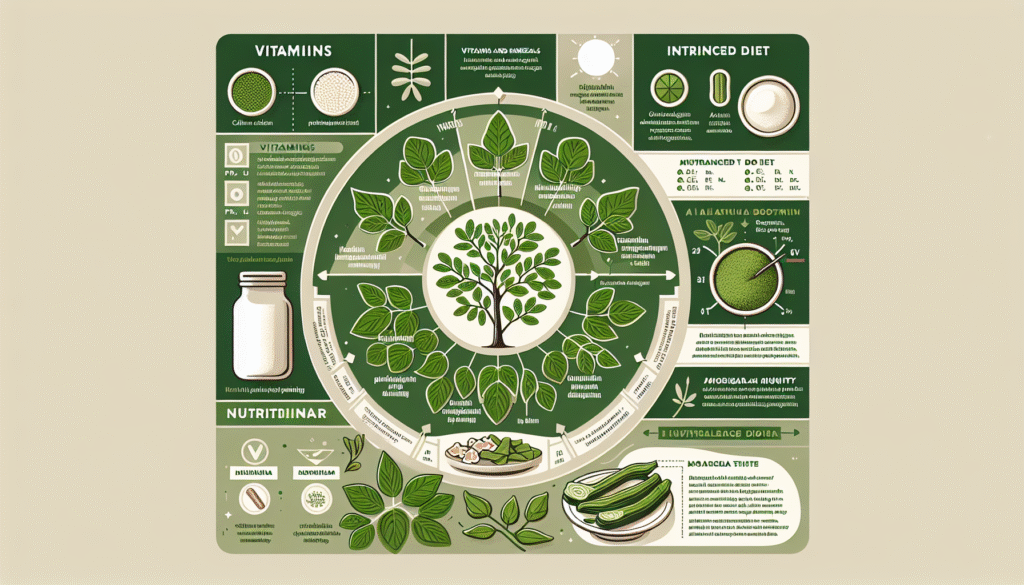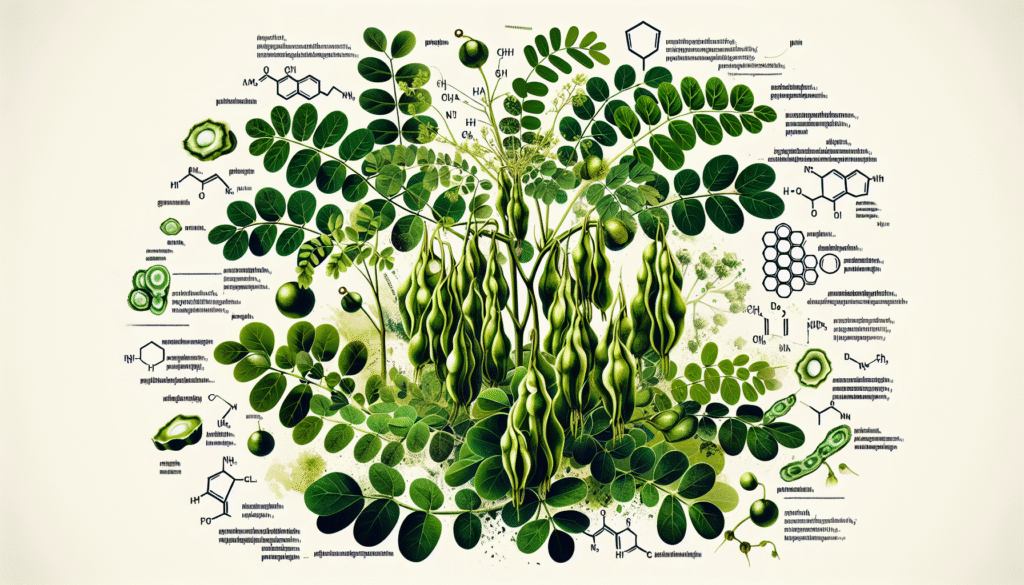Exploring the Nutritional Profile of Moringa

In the world of superfoods, few plants stand out quite like moringa. Often called the “Miracle Tree,” moringa is celebrated for its dense nutritional makeup and wide-ranging health benefits. From vitamins and minerals to protein and antioxidants, moringa offers a complete nutritional package that’s hard to rival.
This article will walk you through the complete nutritional value of moringa, breaking down its key nutrients, health benefits, and why it earns its title as a superfood.
What is Moringa?
Moringa oleifera is a fast-growing tree native to South Asia and parts of Africa. Almost every part of the plant—leaves, seeds, pods, and roots—has nutritional or medicinal use, but the leaves are the most commonly consumed due to their rich nutrient density.
Today, moringa is available worldwide in the form of powder, capsules, teas, and fresh or dried leaves. Its mild, earthy flavor makes it easy to add to a variety of meals.
Moringa Nutrition Facts: What’s Inside?
Let’s break down the most vital moringa nutrition facts. Per 100 grams of dried moringa leaves (which is the most commonly used form), you get:
| Nutrient | Amount per 100g (dried leaves) |
|---|---|
| Protein | 27 grams |
| Vitamin C | 17 mg |
| Vitamin A (Beta-carotene) | 378 mcg |
| Calcium | 2000 mg |
| Potassium | 1324 mg |
| Iron | 28 mg |
| Magnesium | 368 mg |
| Fiber | 20 grams |
| Antioxidants | High (quercetin, chlorogenic acid) |
These numbers are incredibly impressive—especially when you consider that most people consume much smaller amounts (5–10 grams per day) and still reap noticeable moringa health benefits.
1. Moringa is Rich in Vitamins and Minerals
The moringa vitamins and minerals content is where this superfood really shines.

Vitamin A
- Essential for eye health, immune function, and skin.
- Moringa contains beta-carotene, a precursor to vitamin A.
Vitamin C
- A potent antioxidant and immune booster.
- Helps with collagen production and iron absorption.
Calcium
- Moringa has more calcium than milk (gram for gram).
- Supports bone health, especially important for women and the elderly.
Iron
- Moringa has more iron than spinach.
- Crucial for oxygen transport and energy levels.
Potassium
- Helps regulate blood pressure and muscle function.
- Moringa contains more potassium than bananas.
Magnesium
- Aids in nerve function, muscle recovery, and relaxation.
- Often lacking in modern diets.
Other Nutrients:
- Zinc, phosphorus, copper, and selenium are also present in trace amounts.
These values make moringa an excellent supplement for people with nutrient deficiencies or those looking to naturally boost their micronutrient intake.
2. Moringa is High in Plant-Based Protein

Vegetarians and vegans often struggle to find complete plant-based protein sources. Moringa contains all nine essential amino acids, making it a rare complete protein from a plant.
In 100 grams of dried moringa powder, there are about 27 grams of protein, which is comparable to some meats and legumes.
Benefits of moringa protein:
- Aids in muscle repair and growth
- Supports metabolic function
- Enhances energy production
For athletes, fitness enthusiasts, or people on plant-based diets, moringa is a game-changing protein source.
3. High in Antioxidants and Anti-Inflammatory Compounds
Moringa is loaded with powerful antioxidants like:
- Quercetin – helps lower blood pressure
- Chlorogenic acid – supports blood sugar regulation
- Vitamin C and beta-carotene – protect against oxidative stress
Oxidative stress contributes to aging and many chronic diseases. The superfood moringa helps counteract this through its strong antioxidant profile.
Studies suggest that regular moringa intake may reduce markers of inflammation, a root cause of conditions like arthritis, obesity, and heart disease.
4. Fiber for Digestive Health
Moringa contains a significant amount of dietary fiber—about 20 grams per 100 grams of dried powder. This makes it excellent for:
- Promoting gut health
- Supporting regular bowel movements
- Reducing cholesterol levels
Even a teaspoon (around 2 grams) provides a helpful daily fiber boost.
5. Blood Sugar and Cholesterol Control
Research indicates that moringa health benefits include the potential to:
- Lower blood sugar levels
- Reduce cholesterol
- Improve insulin sensitivity
This is especially important for people at risk of type 2 diabetes or heart disease. The chlorogenic acid in moringa slows the absorption of sugar into the blood, supporting steady energy levels and metabolic health.
Moringa vs Other Superfoods
How does moringa compare with other well-known superfoods like kale, spinach, or spirulina?
| Nutrient | Moringa | Kale | Spinach | Spirulina |
|---|---|---|---|---|
| Protein | High | Moderate | Low | Very High |
| Iron | Very High | Moderate | High | Moderate |
| Calcium | Extremely High | Moderate | Moderate | Low |
| Vitamin A | Very High | High | Moderate | Low |
| Antioxidants | Very High | High | High | High |
Moringa stands out for its broad nutrient spectrum, making it a highly versatile and potent choice.
Forms of Moringa & How to Use Them
Moringa is incredibly flexible in how it can be consumed:
1. Moringa Powder
- Add to smoothies, yogurt, oatmeal, or baked goods.
- Recommended dose: 1–2 tsp daily.
2. Moringa Capsules
- Ideal for convenience.
- Follow label instructions (usually 2 capsules/day).
3. Moringa Tea
- Provides a gentle, nutrient-rich drink.
- Can be enjoyed hot or iced.
4. Fresh or Dried Leaves
- Cook like spinach or add to soups and stews.
Each form retains the nutritional value of moringa, though fresh and dried leaves may offer slightly more enzyme activity.
Who Should Use Moringa?
Moringa is beneficial for almost everyone, especially:
- Vegans and vegetarians (for protein and iron)
- Women (rich in calcium, iron, and folate)
- Older adults (bone and heart support)
- Athletes (protein and anti-inflammatory benefits)
- People with chronic inflammation or high blood sugar
However, pregnant women should consult a healthcare provider before consuming moringa regularly.
Potential Side Effects and Precautions
While moringa is generally safe, excessive intake can cause:
- Digestive upset (especially at high doses)
- Interference with certain medications (like blood pressure or diabetes drugs)
Best practice: Start with a small dose (1/2 tsp) and gradually increase. Always buy from reputable, organic sources to avoid contamination.
Sustainability and Moringa Farming
Beyond nutrition, superfood moringa is celebrated for its sustainability:
- It grows quickly in arid regions with little water.
- It improves soil quality.
- All parts of the plant are usable—reducing waste.
Many moringa farms are community-led, supporting economic development in rural areas, especially in Africa and South Asia.
Final Thoughts: Why Moringa Deserves a Place in Your Diet
Whether you’re looking to enhance your diet with more vitamins and minerals, get a plant-based protein boost, or simply enjoy the benefits of one of the world’s most nutrient-dense plants, moringa delivers on all fronts.
Its rich nutrient profile makes it suitable for modern diets and lifestyles, and its versatility ensures there’s a form and flavor for everyone.
By incorporating moringa into your daily routine, you’re not only investing in your own health but also contributing to a more sustainable and nutritionally conscious world.
Certainly! Here’s a FAQ section with at least 5 frequently asked questions relevant to the article “Exploring the Nutritional Profile of Moringa”, incorporating your keywords naturally.
Frequently Asked Questions (FAQ)
1. What are the key moringa nutrition facts I should know?
Moringa is rich in protein, fiber, and essential vitamins and minerals such as calcium, iron, magnesium, vitamin A, and vitamin C. It also contains powerful antioxidants like quercetin and chlorogenic acid, making it a nutrient-dense superfood.
2. What health benefits does moringa offer?
The moringa health benefits include improved energy, reduced inflammation, lower blood sugar and cholesterol levels, enhanced immunity, and support for skin, bone, and digestive health. It also provides a natural source of plant-based protein and fiber.
3. What is the nutritional value of moringa compared to other greens?
Moringa has a superior nutritional value compared to many leafy greens. For example, gram for gram, it contains more calcium than milk, more iron than spinach, and more potassium than bananas. It is also a complete protein source, which is rare in plants.
4. What vitamins and minerals are in moringa?
Moringa vitamins and minerals include high levels of:
- Vitamin A (beta-carotene)
- Vitamin C
- Calcium
- Iron
- Potassium
- Magnesium
These nutrients contribute to moringa’s wide range of health benefits.
5. Why is moringa considered a superfood?
Superfood moringa earns its title due to its exceptional nutrient density, antioxidant content, and versatility. It supports numerous aspects of health, is sustainable to grow, and offers medicinal properties recognized in both traditional and modern science.
Key Takeaways
- Moringa is a nutrient powerhouse packed with vitamins, minerals, antioxidants, and protein.
- It’s an excellent addition to most diets, especially for people with nutrient deficiencies or plant-based lifestyles.
- Available in powder, capsule, tea, and fresh leaf forms, moringa is easy to integrate into daily routines.
- It’s sustainable

Leave a Reply